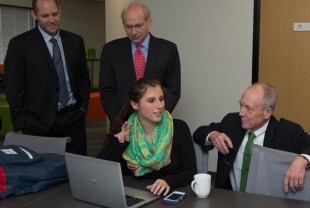Mitchell: Rice OER nonprofit is making ‘power tools’ for education
Education Undersecretary Ted Mitchell visited Rice-based OpenStax Dec. 7 and encouraged the nonprofit’s staff to continue developing high-quality textbooks and open educational resources (OER) that save students money and improve learning.
“It’s about time to put power tools in the hands of teachers and stop handing them hammers and saws to do the work of the 21st century,” Mitchell told OpenStax staff. “That is what you’re doing. These are serious power tools.”

Sophomore Emily Lisa, an intern at Rice nonprofit OpenStax, explains her work to (from right) Education Undersecretary Ted Mitchell, Rice President David Leebron and OpenStax Managing Director Daniel Williamson. (Photo by Jeff Fitlow)
OER refers to freely accessible, openly licensed documents and media that are used for teaching, learning and educational assessment, and Rice’s OER roots are some of the deepest. Rice launched Connexions in 1999. The pioneering effort helped kick off a global movement to change the economics of education with freely available learning materials.
OpenStax’s 2012 launch marked a new era in OER scalability. In a break with traditional OER’s reliance on freely produced, locally managed content, OpenStax is committed to investing in high-quality, peer-reviewed content, including full-color textbooks that are indistinguishable from traditional titles costing hundreds of dollars. By pairing these high-quality, free books with low-cost homework, testing and other course materials from for-profit partners, OpenStax is able to offer an inexpensive “turnkey” solution that includes many of the most attractive advantages of the high-cost options that still dominate the college textbook market.
OpenStax’s catalog of 19 titles is now used by more than 540,000 students and by instructors in more than 2,000 courses worldwide. The books are available free online and at low cost in print and are expected to save students $25 million in the 2015-16 academic year.
Mitchell said OpenStax’s commitment to making textbooks that are easily adoptable for a broad segment of the higher education market is helping to “reduce one of the serious barriers to educational quality and equality in the U.S.”
“Taking advantage of scale, wherever it is, is really important,” he said.
During his visit to Rice, Mitchell met with President David Leebron and Provost Marie Lynn Miranda. Mitchell heard from OpenStax leaders about the latest books that OpenStax is producing as well as progress on OpenStax Tutor, a personalized learning tool that Mitchell said will “deliver just the right material to the student at just the right time to provide the ‘just right’ challenge” and allow students to succeed.
“For centuries, educators have aimed their teaching at a really muddy and unstable middle of any class, whether it’s a college class or high school or elementary class,” Mitchell told a gathering of OpenStax staffers. “What you guys are working on right now is a set of tools that can personalize that experience so that, as a teacher, I am not aiming at the muddy middle. I’ve got a view of the array of where all the students in my class are, and how I can provide whatever impetus I can to help somebody get over a particular set of problems.”


Leave a Reply